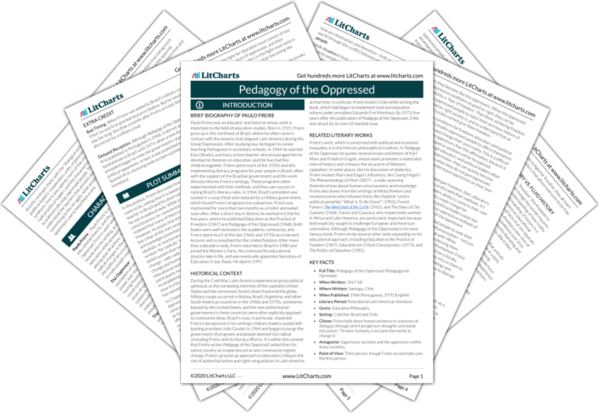Welcome to the LitCharts study guide on Paulo Freire's Pedagogy of the Oppressed. Created by the original team behind SparkNotes, LitCharts are the world's best literature guides.
Pedagogy of the Oppressed: Introduction
Pedagogy of the Oppressed: Plot Summary
Pedagogy of the Oppressed: Detailed Summary & Analysis
Pedagogy of the Oppressed: Themes
Pedagogy of the Oppressed: Quotes
Pedagogy of the Oppressed: Characters
Pedagogy of the Oppressed: Terms
Pedagogy of the Oppressed: Symbols
Pedagogy of the Oppressed: Theme Wheel
Brief Biography of Paulo Freire

Historical Context of Pedagogy of the Oppressed
Other Books Related to Pedagogy of the Oppressed
Key Facts about Pedagogy of the Oppressed
- Full Title: Pedagogy of the Oppressed (Pedagogia do Oprimido)
- When Written: 1967-68
- Where Written: Santiago, Chile
- When Published: 1968 (Portuguese), 1970 (English)
- Literary Period: Postcolonial Latin American literature
- Genre: Education Philosophy
- Setting: Cold War Brazil and Chile
- Climax: Freire boils down human existence to a process of dialogue, through which people turn thoughts and words into action: “To exist, humanly, is to name the world, to change it.”
- Antagonist: Oppressive societies and the oppressors within those societies.
- Point of View: Third-person, though Freire occasionally uses the first-person.
Extra Credit for Pedagogy of the Oppressed
Bad Timing. When Freire was exiled by Brazil’s military coup in 1964, he was first granted asylum in Bolivia. But he wouldn’t stay for long: less than a month after Freire arrived, Bolivia was also struck by a military coup.
Delayed Reception. Although Pedagogy of the Oppressed was first published in Portuguese in 1968, it did not appear on bookshelves in Brazil until 1974, when a new Brazilian president began to relax the government’s stance toward political opponents. In fact, it was published in both English and Spanish first, receiving wide acclaim outside of Freire’s homeland.







